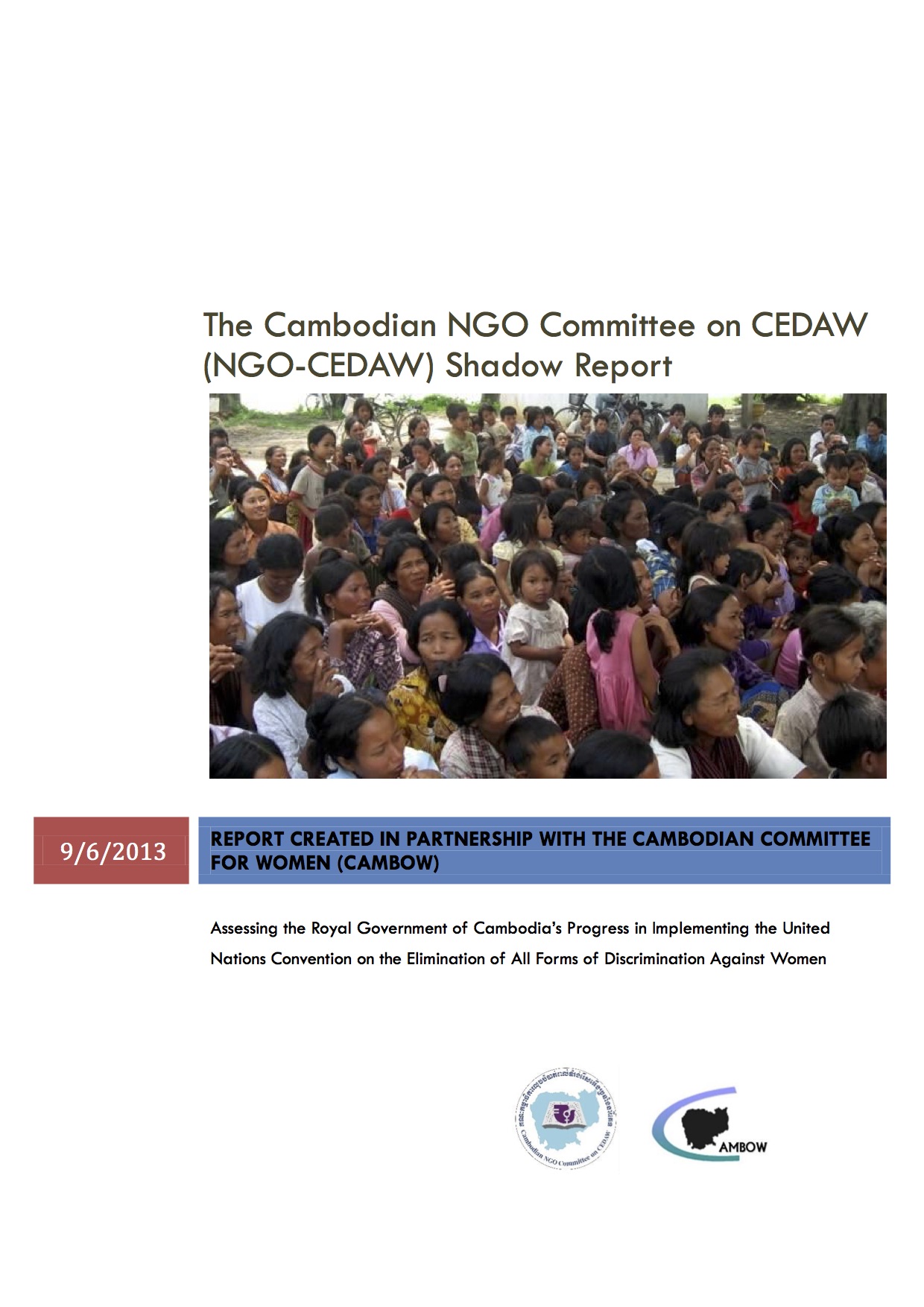
The Cambodian NGO Committee on CEDAW (NGO-CEDAW) Shadow Report
Publication Year: 2013 / Sources: The Cambodian NGO committee on CEDAW (NGO‐CEDAW), The Cambodian Committee for Women (CAMBOW)The RGC in its combined 2010 Fourth and Fifth National Report (the ―RGC Report‖) on the Implementation of the International Convention on the Elimination of All Forms of Discrimination Against Women in Cambodia, makes specific reference to provisions in the Constitution and the Penal Code1, claiming that the existence of these provisions in and of themselves, alongside plans to pass additional laws, guarantees full equality of women with men in the protection and enjoyment of human rights, as well as protection from all forms of discrimination. The adoption of laws guaranteeing equal protection of women and non-discrimination should not be mistaken for the actual delivery of equal rights and non-discriminatory practices, and therefore satisfaction with the spirit and intent of the Convention. Since its last report, the RGC has achieved little measureable progress; stagnation being the norm, with some areas seeing regression.
Download: English | Khmer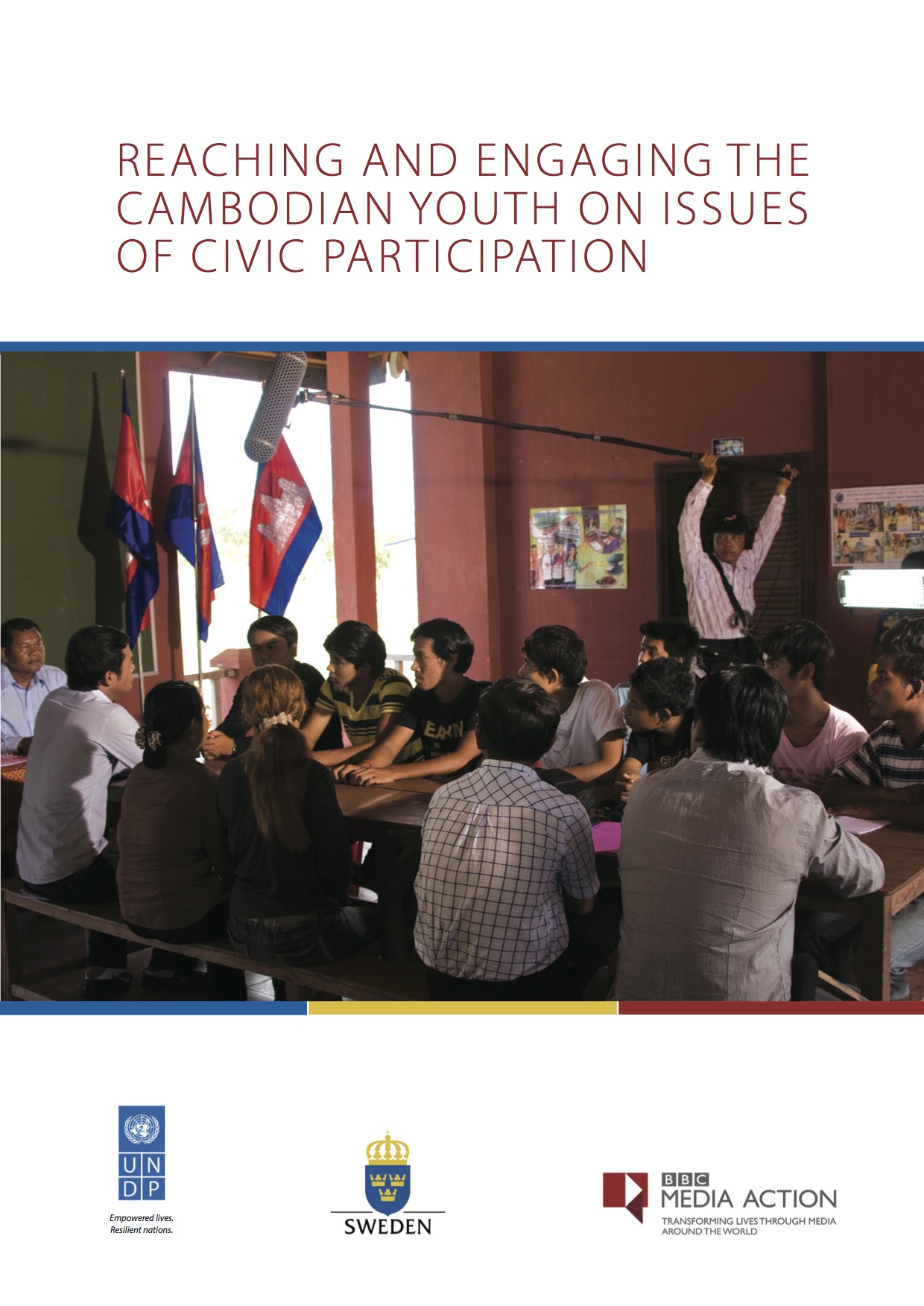
Reaching and Engaging the Cambodian Youth on Issues of Civic Participation
Publication Year: 2014 / Sources: BBC Media Action, Research & LearningThis multimedia project aims to reach young people in Cambodia in order to improve civic knowledge and encourage youth to engage in civic participation. Key programme objectives include improving knowledge and awareness of opportunities for civic participation, gender equality and the skills required for the empowerment of youth. In the run up to the 2013 election, a number of TV and radio Public Service Announcements (‘spots’) were also produced as part of the project to provide key information to the youth target audience to inform them about the voting process.
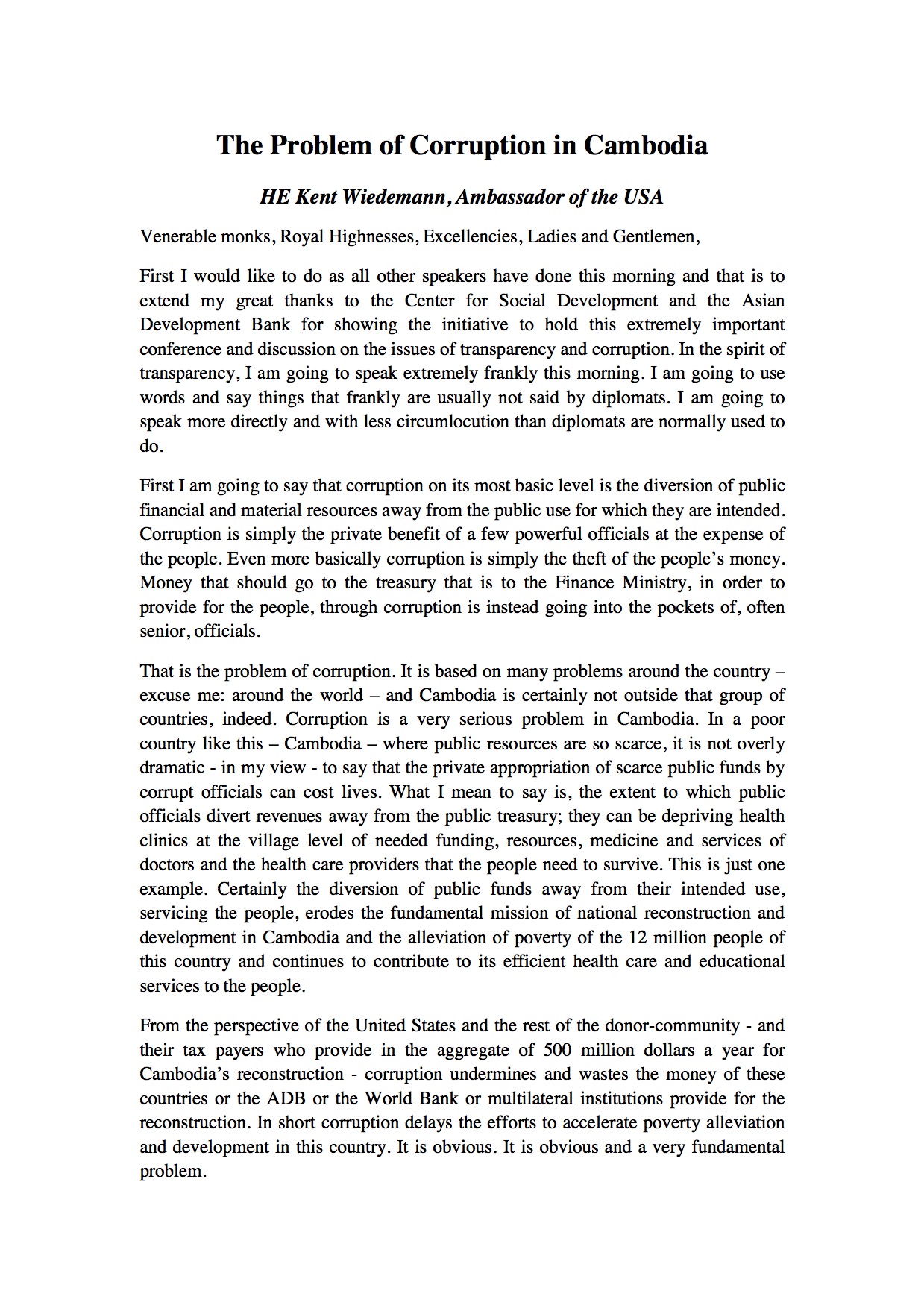
The Problem of Corruption in Cambodia
Publication Year: 2001 / Sources: HE Kent Wiedemann, Ambassador of the USAVenerable monks, Royal Highnesses, Excellencies, Ladies and Gentlemen,
First I would like to do as all other speakers have done this morning and that is to extend my great thanks to the Center for Social Development and the Asian Development Bank for showing the initiative to hold this extremely important conference and discussion on the issues of transparency and corruption. In the spirit of transparency, I am going to speak extremely frankly this morning. I am going to use words and say things that frankly are usually not said by diplomats. I am going to speak more directly and with less circumlocution than diplomats are normally used to do…
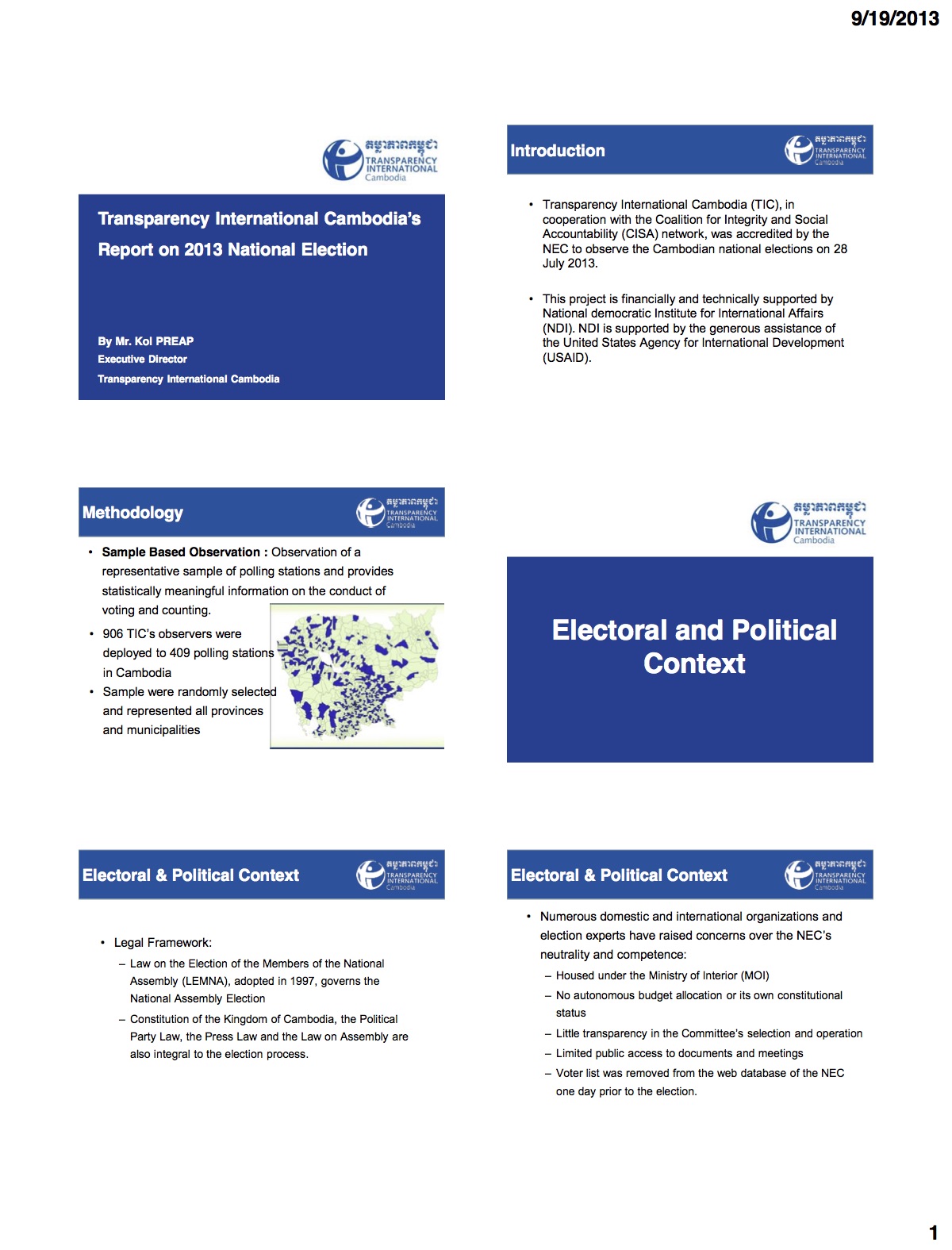
Transparency International Cambodia’s Report on 2013 National Election
Publication Year: 2013 / Sources: Transparency International CambodiaTransparency International Cambodia (TIC), in cooperation with the Coalition for Integrity and Social Accountability (CISA) network, was accredited by the NEC to observe the Cambodian national elections on 28 July 2013. This project is financially and technically supported by National democratic Institute for International Affairs (NDI). NDI is supported by the generous assistance of the United States Agency for International Development (USAID)
Download: English | Khmer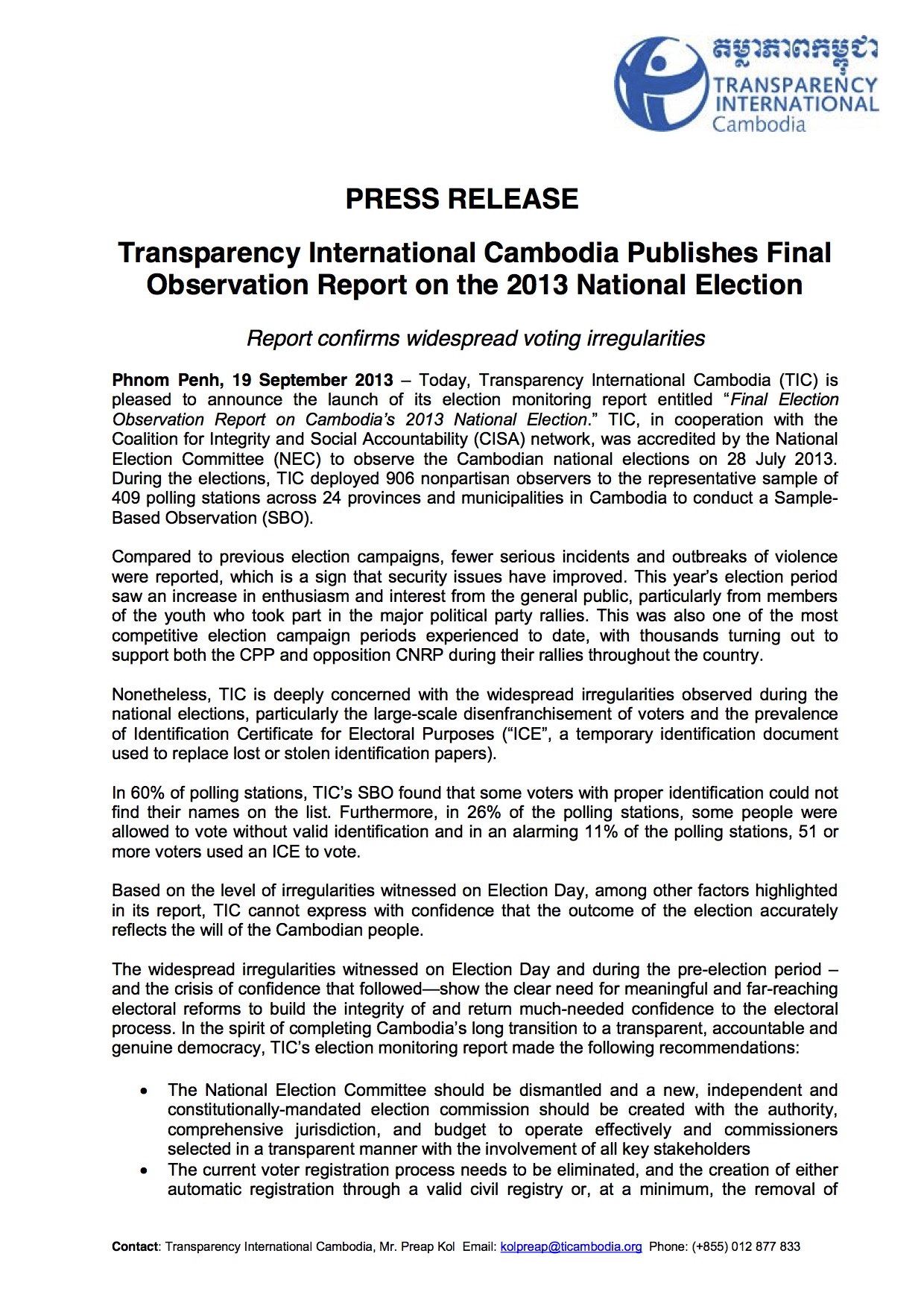
PRESS RELEASE: Transparency International Cambodia Publishes Final Observation Report on the 2013 National Election
Publication Year: 2013 / Sources: Transparency International CambodiaToday, Transparency International Cambodia (TIC) is pleased to announce the launch of its election monitoring report entitled ―Final Election Observation Report on Cambodia’s 2013 National Election.‖ TIC, in cooperation with the Coalition for Integrity and Social Accountability (CISA) network, was accredited by the National Election Committee (NEC) to observe the Cambodian national elections on 28 July 2013. During the elections, TIC deployed 906 nonpartisan observers to the representative sample of 409 polling stations across 24 provinces and municipalities in Cambodia to conduct a Sample- Based Observation (SBO).
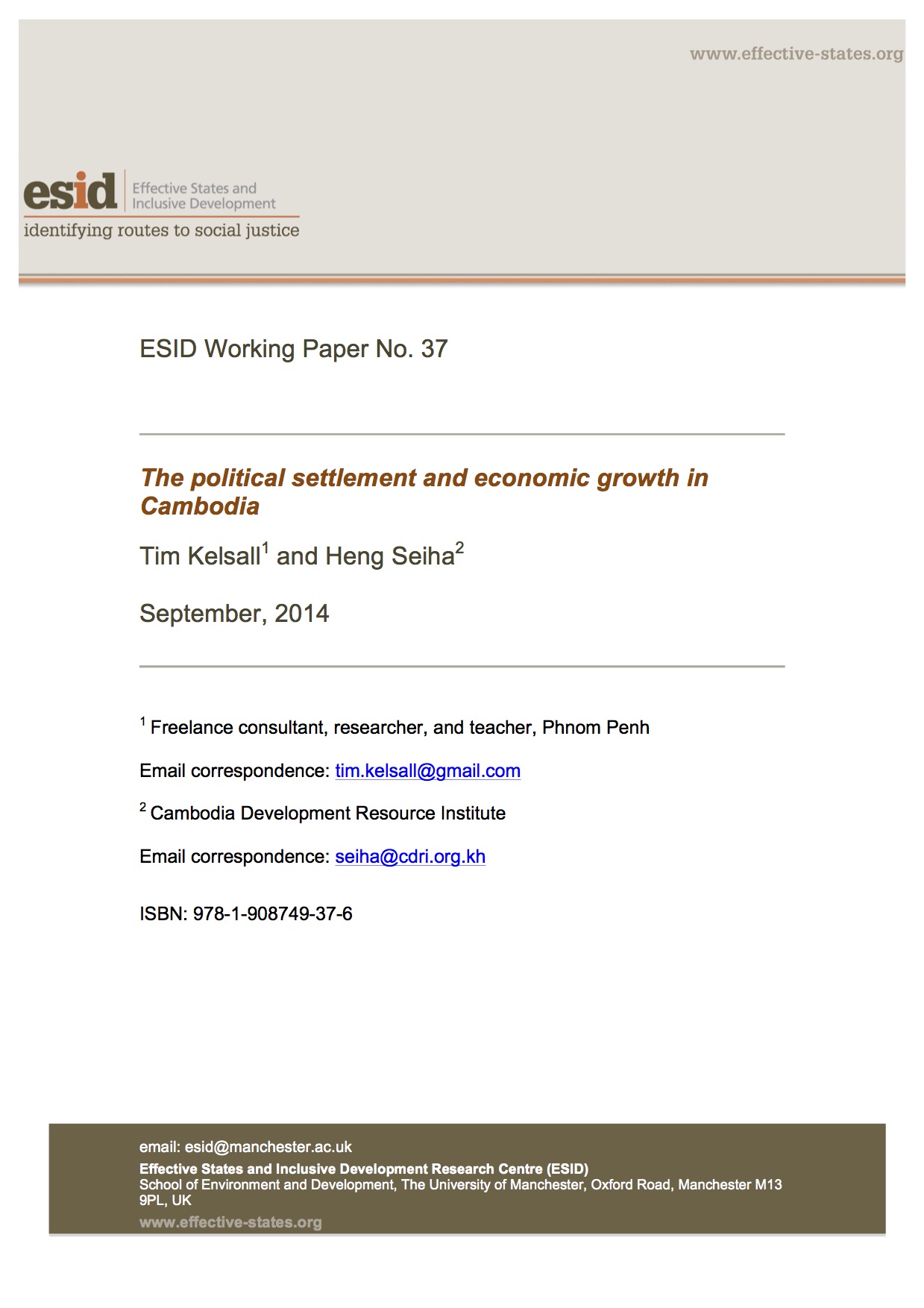
The political settlement and economic growth in Cambodia
Publication Year: 2014 / Sources: Effective States and Inclusive Development Research Centre (ESID)Through interviews conducted in four economic sectors, we show that there has been a positive feedback loop between support for competitive export industries, state capacity, and structural transformation. However, there has also been a negative feedback loop from over-reliance on high-rent industries, to insufficiently inclusive growth and political instability. The political settlement that has underpinned growth and stability for the past 15 years is facing a severe challenge.
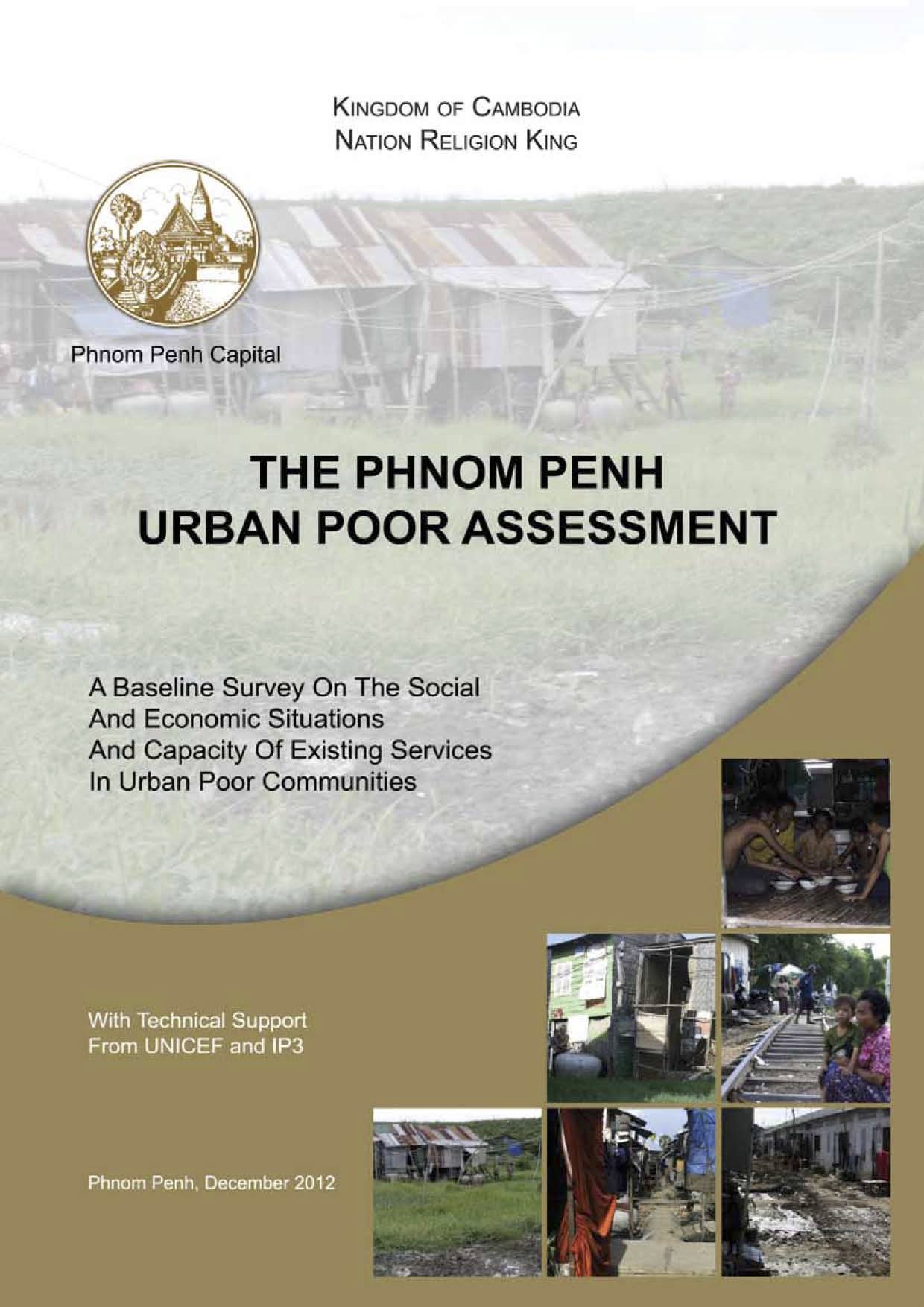
The Phnom Penh Urban Poor Assessment
Publication Year: 2012 / Sources: Phnom Penh Capital HallWhen the Urban Poor Office was established in 2010 in became evident that there was a need for a systematic baseline assessment of poor communities’ living conditions and needs. The survey was planned in mid 2011 and data collection was conducted in November 2011. Individual interviews with 2,033 sample families and 281 community representatives were conducted throughout the field survey. The assessment focuses on the socio-economic situations of the urban poor population and existing capacity in delivery of social services with an emphasis on health, education, water and sanitation, child protection and public infrastructure.
Download: English | Khmer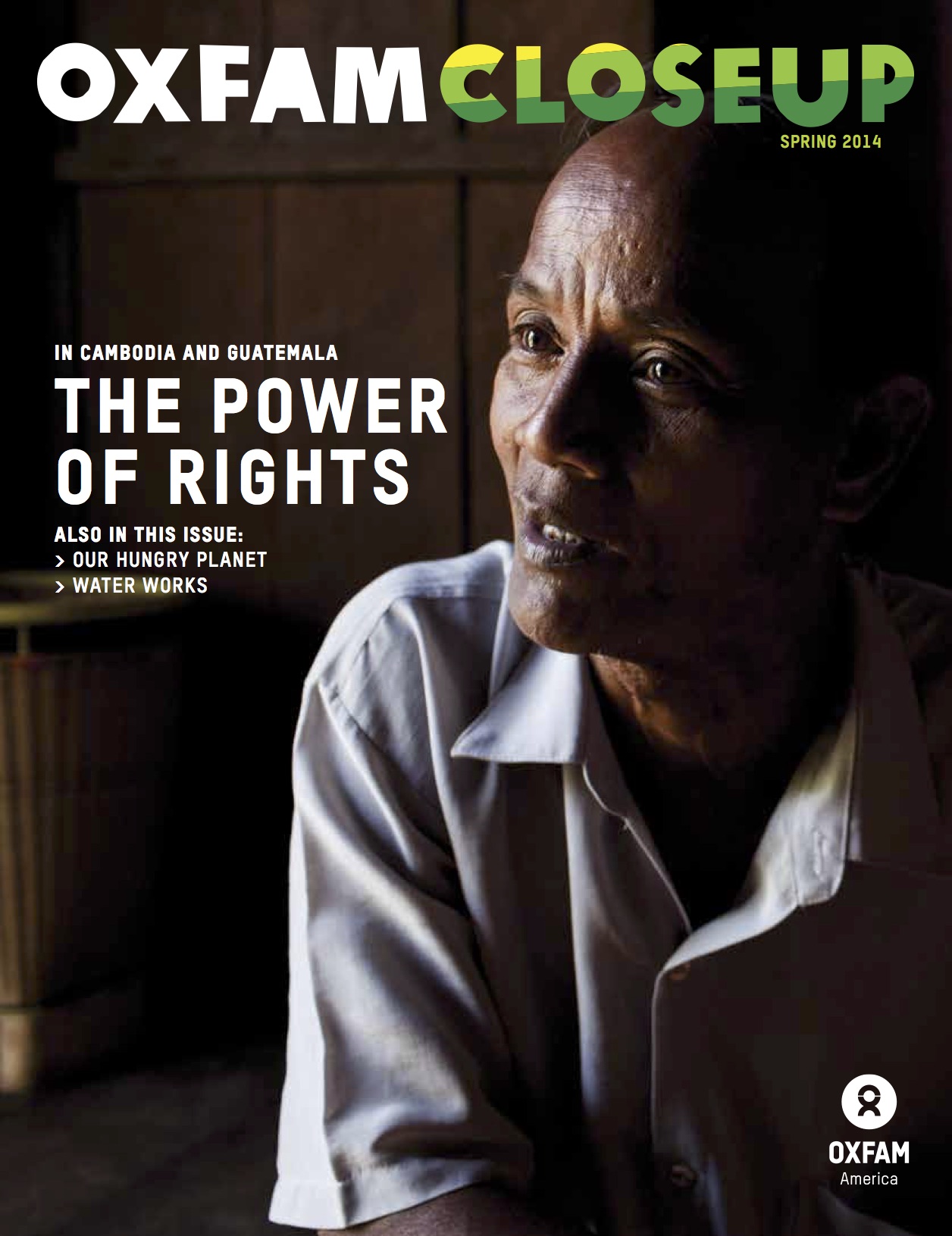
In Cambodia and Guatemala The Power of Rights
Publication Year: 2014 / Sources: OXFAMIn the pages ahead, you’ll read about indigenous people in Cambodia’s Ratanakiri province who, for thousands of years, have enjoyed the bounty from land they hold in common. They fish, hunt, forage, and farm on it, ensuring their families will have both food and income. But there is now enormous pressure on those families to claim title to a small area of their common land, and then sell it to developers who are hungry to establish rubber plantations and gold mines. In the end—when their money from the sale is gone—Ratanakiri’s indigenous people are left with nothing. Poverty replaces their rights to that communal property.
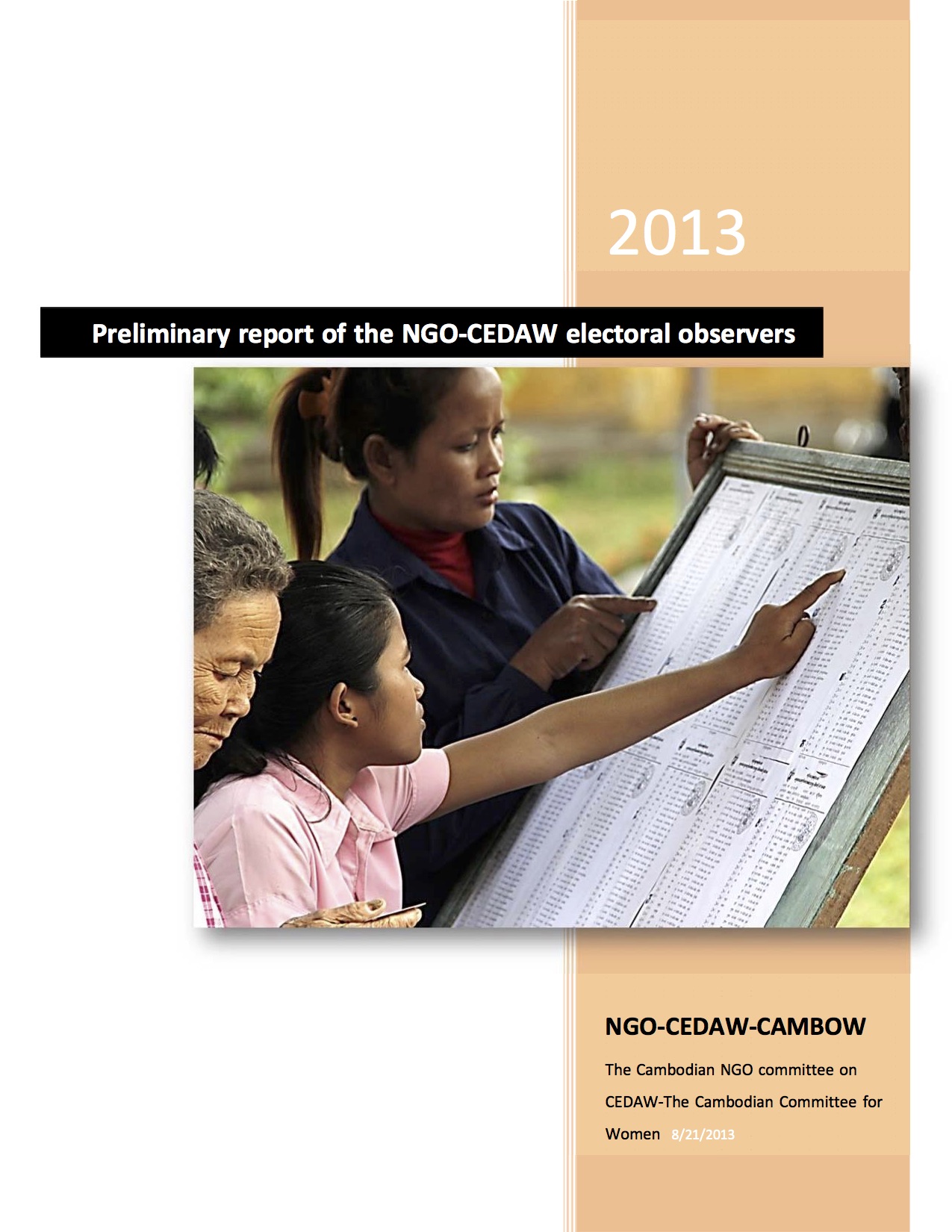
Preliminary report of the NGO‐CEDAW electoral observers
Publication Year: 2013 / Sources: The Cambodian Committee for Women (CEDAW)The Cambodian NGO committee on CEDAW (NGO‐CEDAW) was established in 1995 with the support of the Cambodian Office of UN High Commissioner for Human Rights (COHCHR). It was originally composed of nine Cambodian NGOs. The membership is now 90 members NGOs. Its principal mission is to monitor and provide an independent report on the progress implementation of CEDAW in Cambodia. As a coalition of women oriented organization, activities of NGO‐CEDAW members cover most sectors of activity and of society. NGO‐CEDAW members are directly interested in the electoral process and have been instrumental in providing their support to send election observers.
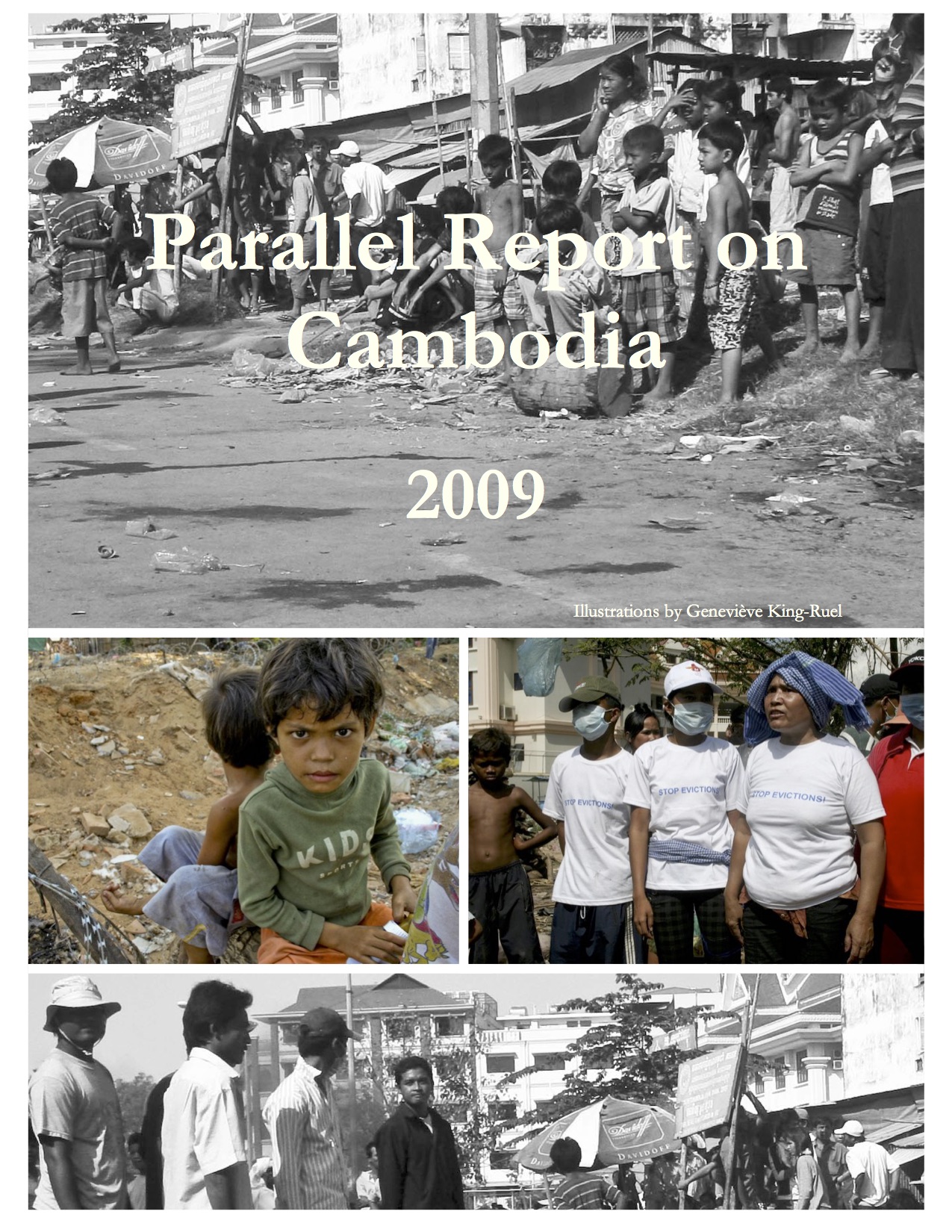
Parallel Report on Cambodia 2009
Publication Year: 2009 / Sources: United Nations Committee on Economic, Social and Cultural RightsThis report is a useful and important contribution by civil society organizations which provides members of the Committee information on key areas of concern which they should explore during their dialogue with Government of Cambodia. The report should also be useful for Committee as it pushes the Government of Cambodia to enhance the implementation of the ESCR. We, as civil society organizations, will continue to monitor closely and collaborate with our government to promote the ESCR after this dialogue and continue to encourage it to fulfill its obligation, as a state member of the Covenant, to submit periodic reports to the Committee in the future.
